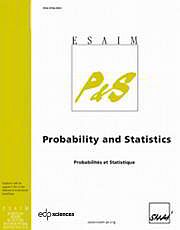Article contents
Optimisation in space of measures and optimal design
Published online by Cambridge University Press: 15 September 2004
Abstract
The paper develops an approach to optimal design problems based on application of abstract optimisation principles in the space of measures. Various design criteria and constraints, such as bounded density, fixed barycentre, fixed variance, etc. are treated in a unified manner providing a universal variant of the Kiefer-Wolfowitz theorem and giving a full spectrum of optimality criteria for particular cases. Incorporating the optimal design problems into conventional optimisation framework makes it possible to use the whole arsenal of descent algorithms from the general optimisation literature for finding optimal designs. The corresponding steepest descent involves adding a signed measure at every step and converges faster than the conventional sequential algorithms used to construct optimal designs. We study a new class of design problems when the observation points are distributed according to a Poisson point process arising in the situation when the total control on the placement of measurements is impossible.
Keywords
- Type
- Research Article
- Information
- Copyright
- © EDP Sciences, SMAI, 2004
References
- 4
- Cited by


